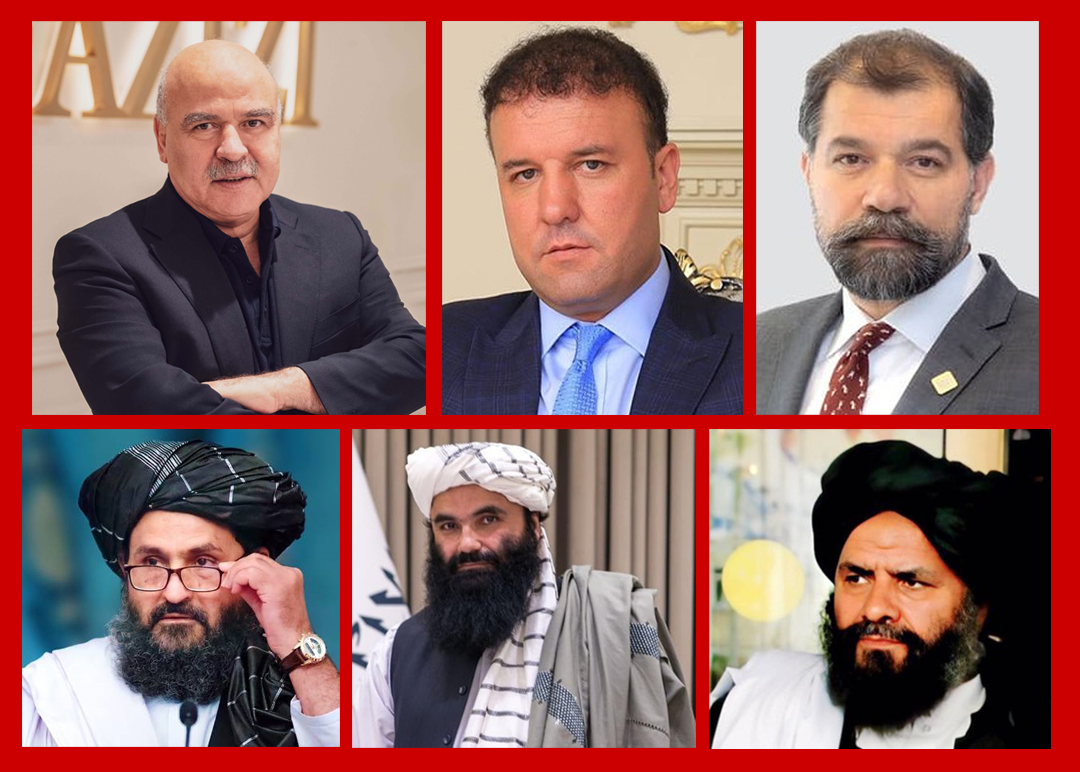Afghanistan Green Trend (AGT), led by Amrullah Saleh, in a new report names Mirwais Azizi, founder of Azizi Group and Azizi Bank, as the central figure in a complex network accused of moving “illicit funds” linked to several senior Taliban leaders out of Afghanistan and placing them in the United Arab Emirates and other countries.
According to the report, money attributed to Abdul Ghani Baradar (Deputy Prime Minister for Economic Affairs of the Taliban), Sirajuddin Haqqani (Interior Minister), Fazel Mazlum (Deputy Defense Minister), and Hamidullah Akhundzada (Minister of Transport and Civil Aviation) circulates through Azizi Bank and partner companies before being invested abroad.
The report describes the Taliban’s protective role as “a crucial part of the mechanism.” Green Trend claims cash transfers are carried out using special access inside Kabul International Airport. The Ahmadyar Group, led by Tawakal Ahmadyar, allegedly holds special permits from the Taliban-run Ministry of Transport and Civil Aviation, allowing them to package large amounts of cash at night and move it to the cargo section of aircraft. The report says flights by Kam Air and, in some cases, Iran Air, are then used to transport these consignments to Dubai or Tehran.
According to Green Trend, Ahmadyar Group vehicles, using special airport passes, move freely inside the airport, maintain an on-site office, and use their cover in fuel operations to quietly move the cash. Once planes land at their destination, the funds are first deposited into front companies and then into companies affiliated with Azizi, ultimately being invested in real estate projects in Dubai—including the artificial island development Palm Jebel Ali.
Green Trend also highlights the role of the “New Ansari money exchange network” in channeling these funds to Dubai. The U.S. Treasury Department has previously stated that between 2007 and 2010 New Ansari moved “billions of dollars” between Afghanistan and Dubai. According to Green Trend, the U.S. Treasury described New Ansari as funded by foreign aid, narcotics revenues, and Taliban financing, while the U.S. Drug Enforcement Administration (DEA) has called it the “fuel” that powers networks fostering “insurgency and corruption.”
The report names several senior Taliban officials as beneficiaries of these transfers, allegedly receiving regular payments. Regarding Abdul Ghani Baradar, it claims he regularly receives a “share” of the money, some of which is reinvested abroad. In the case of Sirajuddin Haqqani, it cites regular payments made by Ahmadyar Group, with funds reportedly moved through Ahmadyar, Dawi Oil, Kam Air, and the Khairkhwa Group; the report also mentions the involvement of his nephew, Muslim Haqqani, in concealing and moving his money through these companies.
For Fazel Mazlum, the report says funds linked to him, along with money belonging to the Ahmadyar family, are transferred via Ahmadyar Group and Azizi Bank to Dubai and other destinations. As for Hamidullah Akhundzada, the Taliban’s Minister of Transport and Civil Aviation, the report alleges his money is placed and invested through Ahmadyar Group, Dawi Oil, Kam Air, and Khairkhwa Group.
On the operational side, Green Trend describes Azizi Bank as the “facilitation hub” and names close associates of Mirwais Azizi as figures responsible for obscuring the origins of funds. These include Sharam Gulzad, Azizi’s son-in-law and head of Gulzad Group, alleged to act as a parallel channel for concealing money flows, and Jawed Ludin, former Deputy Foreign Minister under the Republic, who reportedly uses his political connections to manage overseas funds and facilitate investments.
The report also names Haji Mohammad Rafi Azimi (a money exchanger sanctioned by the U.S. Treasury in the New Ansari case) and Zelgai Azimi, head of Azimi Group, as important links in the network. It adds that Haji Rafi Azimi—sanctioned under the U.S. Foreign Narcotics Kingpin Designation Act for “bribing to protect traffickers” and “financially supporting the Taliban”—was based in Türkiye before the fall of the Republic, but returned to Kabul after the Taliban takeover. Any transaction with him by U.S. persons is prohibited.
In addition, Green Trend claims that official contracts with international organizations were used as a cover for illicit transfers. The report names contracts with the World Food Programme (WFP), United Nations Assistance Mission in Afghanistan (UNAMA), United Nations Development Programme (UNDP), International Committee of the Red Cross (ICRC), International Rescue Committee (IRC), and the Swedish Committee for Afghanistan (SCA), alleging that payment confirmations tied to these contracts were manipulated or used as cover for moving money into offshore accounts.
In this process, a company affiliated with Ahmadyar Group called “Specialist Consulting” allegedly processed payments through UAE banks—including First Abu Dhabi Bank—and Kabul money exchanges. The report attaches purported records of transfers between Specialist Consulting and Ecolog International, a logistics firm based in Abu Dhabi. It also cites ACCL International, owned by Haji Habibullah Pirzada, as another channel. Dawi Oil (formerly owned by Abdul Ghaffar Dawi and now linked to Ahmadyar) and Khairkhwa Oil (owned by Mayel Khairkhwa and managed by Haji Bahadur Khairkhwa) are also listed as firms used to mask money transfers under the guise of contracts with UN agencies. Meanwhile, the Najib Zarrab group in Kabul is described as a commercial facilitator, channeling funds to Dubai through its import-export and money exchange networks.
The report juxtaposes the public image of Mirwais Azizi with these allegations, noting that promises such as a USD 10 billion investment in Afghanistan’s energy and railway sectors, a 3-billion-dirham hospital project in Dubai, and a USD 500 million health complex in Kabul have shown “no tangible progress” by the time of publication.
According to the report’s annexes, audited financial statements for Azizi Bank for the year ending December 2023 indicate a decline in profitability and signs of liquidity pressure over the past three years. It also refers to legal disputes, including an agreement in which an Azizi representative allegedly committed to pay USD 58 million in profit to Sayed Rahmatullah Seddiqi, a shareholder in Bakhtar Bank, which has not been fulfilled. Several other financial disputes were reportedly referred to the Attorney General’s Office in 2020.
Deeyar TV cannot independently verify these allegations. As of the time of publication, Azizi Group had not responded to questions sent by Deeyar TV. Should a response be received, the position of individuals and companies named in this report will be published in full and without alteration.







